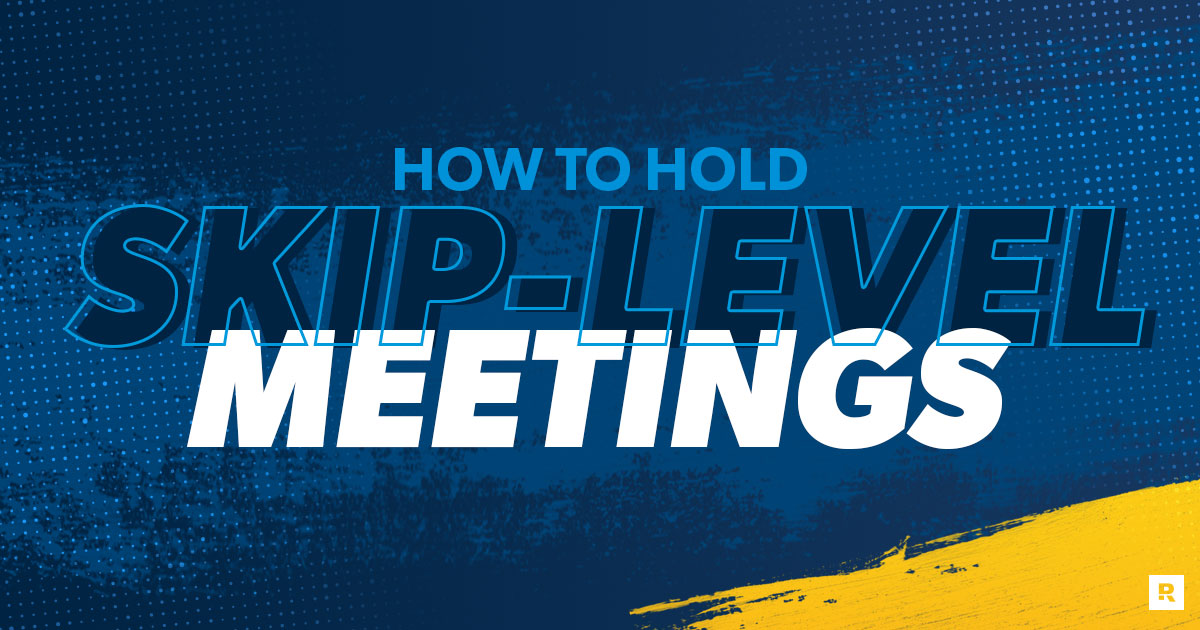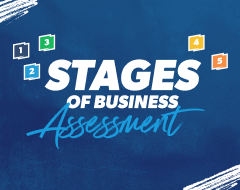
Smart business leaders pull instead of push. They know when to step back in their business, get a fresh perspective, and then use what they learn to help move their team and their mission forward. But how do they get that fresh perspective? Well, sometimes it starts by doing things differently. That’s where skip-level meetings come into play.
What Is a Skip-Level Meeting
Skip-level meetings are when a company’s top leader, like the business owner or CEO, bypasses the normal reporting structure and meets directly with team members who report to other directors or managers in the company. Basically, you’re skipping a reporting level. (Get it now?)
The leader’s goal is to learn from team members they wouldn’t normally hear from and get a better idea of where the company is winning and where it might have blind spots. But how do you have productive conversations with team members who aren’t your direct reports—especially without giving off the vibe that they’re in trouble? You make skip-level meetings part of your overall communication strategy—and you run them like a rock star.
Wait, are you sure my team members won’t feel like they’re being called to the principal’s office?
They shouldn’t. Once everyone is clear on what a skip-level meeting is, those school principal vibes probably won’t even be a thing. That said, if you don’t set up a skip-level meeting with thought and care, things could backfire. So it’s good to be absolutely clear on these two points:
1) A skip-level meeting is only weird if you make it weird or if your timing is weird.
2) A skip-level meeting can be an amazing tool if you make a solid plan and communicate like the rock star we already know you are.
Now, let’s push all the elephants out of the room and do some amazing team and business building!
A Skip-Level Meeting Is:
- A preplanned one-on-one or group meeting between a key leader and team members who normally report to the key leader’s directors or managers
- A tool to strengthen communication between leaders and team members who don’t typically interact with each other
- A coordinated effort to build unity and show that you value your team
- A way to bridge knowledge gaps and share different perspectives
- A source of engagement and productivity
A Skip-Level Meeting Isn’t:
- A last-minute, knee-jerk reaction to a toxic work situation
- A time to gossip, give bad news, or discipline the team member
- A power play over a manager or director
- A decision-making, problem-solving or big-idea moment
- A chance for the top dog to bark out orders and remind the team who’s the alpha
If you need to meet with someone else’s direct reports to correct a situation, that’s a much different conversation for a much different setting. Wondering how you can prep for having healthy confrontation in your business? Check out this article.
Preparing for Your Skip-Level Meeting From Start to Finish
Now that your head is in the right space, it’s time to plan your meetings and loop in your entire team. Remember what Zig Ziglar said about doing intentional, up-front work: “There are no traffic jams on the extra mile.” Putting in the effort now will set you and your team up to get the most out of your time together. Here’s how:
- Start by talking to your managers and directors so they know who you’ll meet with, when you’ll meet, and what you’ll talk about. To be clear is to be kind, so fill them in on the questions you plan to ask the team members and how you’ll use their input.
- Let your team leads give the people who normally report to them the heads-up. This will help ease any concerns and signal that you’re all in this together.
- Schedule follow-ups with your directors and managers (before any skip-level meetings happen) to share what you learn. Great leadership means overcommunicating and keeping the trust and respect flowing with your team.
- Make sure you have the time to meet with all (yes, every single one) of your directors’ or managers’ team members. This may mean you focus on just one or two departments at a time, but you should still communicate the full plan and stick to it the best you can.
- Set a realistic skip-level meeting time. An example would be 40 minutes per one-on-one, held every January for some groups and September for the rest.
- Add 10 minutes to the end of each meeting to answer team member questions and another 10 minutes afterward to write down what you learned. Don’t forget to note any extra actions you’ll need to take.
- Block off time on your calendar when all the meetings are done to look at trends and ideas from those meetings.
- Follow up with your leaders. This is where you’ll work through next steps and close any decision-making loops.
- Get your whole team together in a meeting to tell them what you learned and what company changes might be in the works as a result.

Ready to Level Up Your Business?
Find out your Stage of Business with our free assessment and get additional resources to help you level up by focusing on the right things at the right time.
7 Tips for How to Run Skip-Level Meetings
Okay, the planning is done, the meetings are set, and you’re ready to sit knee to knee with team members you don’t hear from every day. Here are seven pro tips to send you on your way to being a two-thumbs-up, five-gold-stars, and double-high-five meeting machine.
1. Lead with clear purpose.
Remind every team member why the company exists and how they’re part of fulfilling the mission.
2. Set the tone.
You’re there to learn, not to solve all the world’s problems or make earth-moving decisions. Communicate with respect, ask great questions, and then listen.
3. Be open to what your team member is sharing.
Don’t defend, argue or overexplain anything. This is a safe space. If you can’t treat it like one, you shouldn’t be meeting. You should want to hear their concerns—even if you don’t see things the way they do. Here are some solid responses to keep the conversation going: “Thank you for being honest. Tell me more about that.” “Can you clarify that?” “Today my focus is on learning. Let’s talk more about that in a separate meeting, and I’ll follow up once I have the bigger picture.”
4. Encourage your team members.
A simple, sincere thank-you goes a long way. Bonus points for giving feedback on something specific you know they’re kicking butt on. Double bonus points if you know their DISC personality profile and communicate in the way that means the most to them.
5. Share next steps.
Let the team members know you’ll be blocking off time for yourself to put all the learnings together. Then, end with a specific note of appreciation for what they shared and encourage them to talk with their direct leader as they need to.
6. Stick to the follow-ups you promised.
If working through concerns is more complicated than you thought, just say so and let them know you’re working on it. (Great follow-ups build unity and make room for healthy and honest conversations.)
7. Consider creating new key performance indicators (KPIs).
KPIs help your team members see where the business is hitting or missing the mark.
Sample Skip-Level Meeting Questions
When it comes to skip-level meetings, remember: You don’t want an elephant to even poke its trunk in the room. So, just lead with a smile and talk to team members . . . as in have honest, natural conversations with them. That should look like going from light, general topics to deeper, more business-focused ones. Here are some examples of questions to help you guide the conversation.
General:
- Where did you grow up?
- What’s your family like?
- What do you like to do outside of work?
- What do you like to read, watch or listen to the most?
- What do you like most about your role in our company?
Job:
- What brought you to our business?
- How have you grown through your work?
- Is anything holding you back from growing?
- What’s the best thing about working with your team and leader? What’s the hardest?
- What’s something you would like to start, stop, change or continue in your work?
- How supported do you feel in your work? What resources or changes would help improve that?
Company:
- How do you connect with our company’s mission and vision?
- How well do you see us nailing our mission (or not nailing it) companywide and in your team?
- How do you feel about where our company is going?
- Are there any situations you think our leaders have or haven’t handled well?
- What questions or concerns do you have about a trend you’ve seen in our leadership?
Close:
- What’s something I might not be seeing that you think is important to point out?
- What final thoughts do you have on our business and how the leadership team can help you?
What’s Next
Now that you know how to run skip-level meetings like a pro, it’s time for you to step back and get a fresh perspective so your business and leadership can grow. In EntreLeadership, #1 national bestselling author Dave Ramsey guides you to everything you ever wanted to know about how to build strong teams and do work that matters.
If you’re looking for even more practical business and leadership tools, tune in to The EntreLeadership Podcast (and subscribe while you’re at it) to hear from today’s top business and personal growth experts.
Did you find this article helpful? Share it!
玻璃钢生产厂家榆树玻璃钢花盆花器商场外摆美陈艺术吉林室内雕塑玻璃钢萍乡玻璃钢雕塑加工玻璃钢吉祥卡通雕塑山东装饰商场美陈批发天津人物玻璃钢雕塑市场乐从玻璃钢人物雕塑业界口碑好太原玻璃钢雕塑销售厂家日照玻璃钢关公雕塑玻璃钢雕塑拼接视频广东商业商场美陈制造长宁区进口玻璃钢雕塑价格行情湖南景观标识玻璃钢人物雕塑宿迁哪里有做玻璃钢雕塑商场美陈购买玻璃钢雕塑鸡辽阳人物玻璃钢雕塑制作银川玻璃钢雕塑价格惠州玻璃钢雕塑报价表重庆玻璃钢仿真水果雕塑定制郑州标识标牌玻璃钢仿铜雕塑玻璃钢花盆可以用电钻开孔玻璃钢雕塑翻新的处理方法浙江商业商场美陈多少钱四川主题商场美陈供货商商场内部美陈装饰玻璃钢雕塑武汉黑龙江玻璃钢雕塑制作厂家商场中庭美陈春夏香港通过《维护国家安全条例》两大学生合买彩票中奖一人不认账让美丽中国“从细节出发”19岁小伙救下5人后溺亡 多方发声单亲妈妈陷入热恋 14岁儿子报警汪小菲曝离婚始末遭遇山火的松茸之乡雅江山火三名扑火人员牺牲系谣言何赛飞追着代拍打萧美琴窜访捷克 外交部回应卫健委通报少年有偿捐血浆16次猝死手机成瘾是影响睡眠质量重要因素高校汽车撞人致3死16伤 司机系学生315晚会后胖东来又人满为患了小米汽车超级工厂正式揭幕中国拥有亿元资产的家庭达13.3万户周杰伦一审败诉网易男孩8年未见母亲被告知被遗忘许家印被限制高消费饲养员用铁锨驱打大熊猫被辞退男子被猫抓伤后确诊“猫抓病”特朗普无法缴纳4.54亿美元罚金倪萍分享减重40斤方法联合利华开始重组张家界的山上“长”满了韩国人?张立群任西安交通大学校长杨倩无缘巴黎奥运“重生之我在北大当嫡校长”黑马情侣提车了专访95后高颜值猪保姆考生莫言也上北大硕士复试名单了网友洛杉矶偶遇贾玲专家建议不必谈骨泥色变沉迷短剧的人就像掉进了杀猪盘奥巴马现身唐宁街 黑色着装引猜测七年后宇文玥被薅头发捞上岸事业单位女子向同事水杯投不明物质凯特王妃现身!外出购物视频曝光河南驻马店通报西平中学跳楼事件王树国卸任西安交大校长 师生送别恒大被罚41.75亿到底怎么缴男子被流浪猫绊倒 投喂者赔24万房客欠租失踪 房东直发愁西双版纳热带植物园回应蜉蝣大爆发钱人豪晒法院裁定实锤抄袭外国人感慨凌晨的中国很安全胖东来员工每周单休无小长假白宫:哈马斯三号人物被杀测试车高速逃费 小米:已补缴老人退休金被冒领16年 金额超20万

